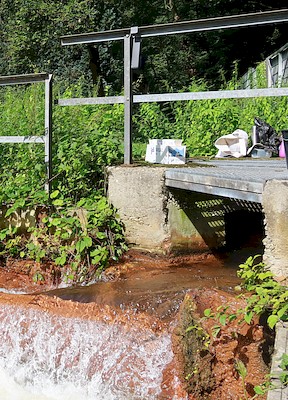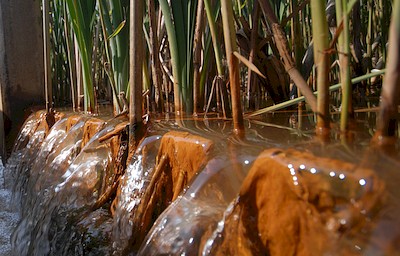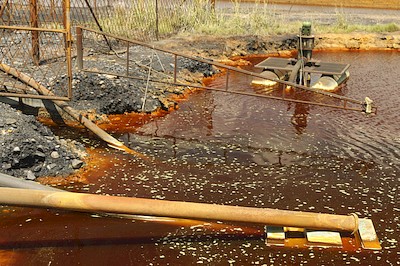From Ground Water to Mine Water 2023
Mine Water Management, Remediation & Mine Water Sampling Course
From Ground Water to Mine Water
Pretoria, March 14 — 16, 2023
Course Material
- only registered participants will get a link to the course material
Venue
The workshop will take place in the “137 Murray Guesthouse”, Pretoria, South Africa, 137 Murray Street, Brooklyn; www.murray137.co.za
Programme
-
Introduction Tuesday, March 14 (9:00 – 17:30)
Tuesday, March 14 (9:00 – 17:30)
Historical Background
Mining Methods
Technical Aspects
Water in Mines
Mine Dewatering -
Wednesday, March 15 (9:00 – 17:30)
Mine Flooding
Mine Water Geochemistry
Flooding Prediction
Mine Water Treatment -
Thursday, March 16 (9:30 – ≈ 17:00)
Mine Water Sampling in the field – Sibanye Gold West Rand Mine Water Treatment Plant (with own car and PPE)
Themes
 In the last decades, worldwide efforts have been conducted to understand acid mine drainage (AMD), mining influenced water (MIW) and its abatement. Yet, passive and active treatment methods as well as enhanced natural attenuation are still not fully understood and need further investigations. This workshop will introduce mine water issues in general and treatment methods for contaminated mine water. During the introduction, the participant will learn basic geochemical mechanisms that can be observed in mines and result in ground or surface water contamination. Simple case studies shall exemplify which environmental impacts are caused by mining and how the hydrogeological and ecological surroundings might be altered and can be limited. Usually, hydrogeologists and non-mining engineers are not familiar with the mining terms. This is also true for the situation underground, especially if it comes to historic mining and to acid mine drainage. Therefore, the first part of the workshop aims to provide a general understanding of the terms and conditions in a mining environment. To work a mine on a medium or long-term basis, the mine workings have to be kept dry. The most important mine pump types will be described and which drainage technologies might be necessary. After mining ceases, the mine workings are usually flooded. To predict or calculate mine flooding, it is necessary to understand the hydrogeological situation on-site. Several theoretical methods and case studies will be described and discussed along with proper sampling technic (field trip). To develop the most advantageous treatment strategy, the temporal and spatial development of a mine flooding have to be understood. Similarly, it is necessary to understand the chemical development of mine flooding. Based on that data a conceptual model and a treatment option can be planned. The last part of the workshop will give an introduction to mine water treatment.
In the last decades, worldwide efforts have been conducted to understand acid mine drainage (AMD), mining influenced water (MIW) and its abatement. Yet, passive and active treatment methods as well as enhanced natural attenuation are still not fully understood and need further investigations. This workshop will introduce mine water issues in general and treatment methods for contaminated mine water. During the introduction, the participant will learn basic geochemical mechanisms that can be observed in mines and result in ground or surface water contamination. Simple case studies shall exemplify which environmental impacts are caused by mining and how the hydrogeological and ecological surroundings might be altered and can be limited. Usually, hydrogeologists and non-mining engineers are not familiar with the mining terms. This is also true for the situation underground, especially if it comes to historic mining and to acid mine drainage. Therefore, the first part of the workshop aims to provide a general understanding of the terms and conditions in a mining environment. To work a mine on a medium or long-term basis, the mine workings have to be kept dry. The most important mine pump types will be described and which drainage technologies might be necessary. After mining ceases, the mine workings are usually flooded. To predict or calculate mine flooding, it is necessary to understand the hydrogeological situation on-site. Several theoretical methods and case studies will be described and discussed along with proper sampling technic (field trip). To develop the most advantageous treatment strategy, the temporal and spatial development of a mine flooding have to be understood. Similarly, it is necessary to understand the chemical development of mine flooding. Based on that data a conceptual model and a treatment option can be planned. The last part of the workshop will give an introduction to mine water treatment.
Introduction, Historical Background
Within the introduction, the fundamental geochemical mechanisms that occur in mines and result in groundwater contamination will be explained. Participants with a hydrogeological as well as those with a mining background will have a common mining-hydrogeological vocabulary after the first part of the lecture. Examples will demonstrate the effects of mining towards groundwater and the environment as well as the methods in which way these effects can be remediated or avoided.
Mining methods, Technical terms
Hydrogeologists often are not adequately familiar with the vocabulary used in mining. Furthermore, not each hydrogeologist is familiar with the conditions underground, especially in historical mines with acid mine drainage. These deficits will be eliminated during this part of the lecture by describing and explaining technical terms.
Water and Water Inrushes
Inside mines, both local and temporal variations of water inflows with occasionally intensively alternating water volumes are observed. Selected examples show the reasons for water inrushes as well as procedures of how to reduce or avoid destructive water inflows.
Dewatering methods; Recharge
To run a mine in the long term the excavations have to be kept dry. The most important types of pumps and their capacity will be introduced to the participants. In addition, dewatering methods depending on the kind of mine (open pit mine, underground mine) will be illustrated. There will also be an introduction concerning the installation of dewatering wells and the advantages and disadvantages of several dewatering methods.
Mine flooding
After mining activities are abandoned the open excavations normally get flooded. This needs detailed knowledge about the hydrogeological environment to conduct approximate calculations about the way the mine will be flooded. Different methods and examples including their advantages and disadvantages will be presented.
Mine Water Geochemistry
Geochemical reactions are the fundamental requirement to understand the processes that go on during and after mining activities. On the basis of the interactions of rock, oxygen and mine water the development of typical secondary minerals will be explained. There will also be an introduction to the processes of disulfide oxidation and the development and methods to avoid acid mine drainage.
Prediction of Mine Flooding
 To develop the most advantageous mine water treatment system, it is necessary to predict the temporal and spatial development of mine flooding. At this point, the most important models which can be used for mine flooding predictions will be presented. Selected examples will demonstrate the results of those predictions.
To develop the most advantageous mine water treatment system, it is necessary to predict the temporal and spatial development of mine flooding. At this point, the most important models which can be used for mine flooding predictions will be presented. Selected examples will demonstrate the results of those predictions.
Mine Water Treatment
Finally, the fundamental processes of conventional and alternative mine water treatment will be explained. The most common methods of mine water treatment of both groups will be explained and examples will demonstrate the processes involved in mine water treatment plants.
Costs & Registration
| Regular | IMWA / WISA members |
Students | Additional Course Material |
|
| Theory (March 14 – 15) | R 4900 | R 3700 | R 1200 | R 1200 |
| Mine Water Sampling (March 16) | R 1800 | R 1500 | R 400 | R 400 |
| Copy of my book “Mine Water Treatment” | 120 € | – | – | – |
For registration, please click here or send an e-mail to Diese E-Mail-Adresse ist vor Spambots geschützt! Zur Anzeige muss JavaScript eingeschaltet sein!




